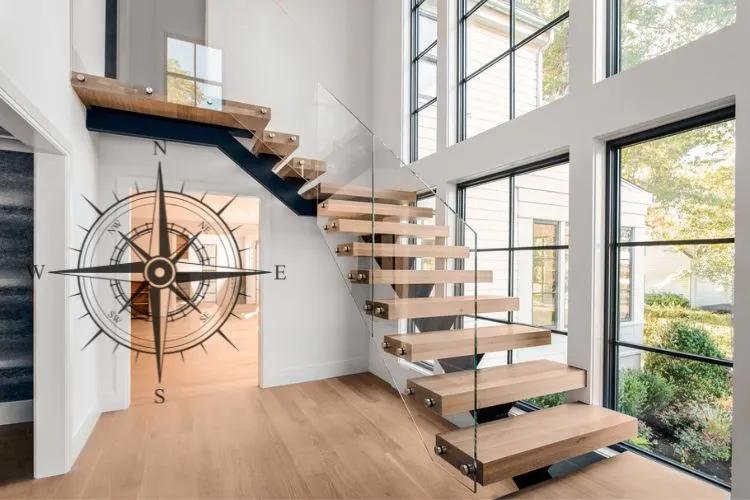Vastu of Staircase – Vastu for Stairs Meaning, Direction, Importance, Do’s and Don’ts

Staircases or stairs are an essential component of any multi-story home. Stairs allow you to quickly and fluently move from one level of your home to another. Staircases are very important in Vastu shastra. It is said, believed, and even validated that a staircase that does not comply with Vastu shastra rules and regulations leads to frequent – and in many cases, major accidents, loss of wealth, and mental tension.
On the other hand, if the Vastu for Stairs is well placed and built according to Vastu, the residents will enjoy wealth, health, and peace of mind.
Are you really Happy with the Vastu Tips for Home? Consult India’s Best Vastu Experts and get all answers to your problems
Vastu for Stairs: Why Is It Essential?
There have been many examples where a family or an individual has severe financial and health problems. When an accurate Vastu analysis of such houses was performed, it was discovered that in most cases, the staircase of the home was the root cause of all the issues. Why? The stairs did not comply with Vastu rules and guidelines.
Below is a compiled list of problems caused by this defect to help you understand the risks associated with Vastu non-compliant stairs.
Yes, “defect,” understand that in Vastu shastra, failure to comply with Vastu rules and guidelines is a major – and obviously – severe defect.
Vastu for Stairs: What Could Go Wrong
Financial problems include loss of wealth, debt, and bankruptcy. Frequent accidents, both fatal and minor, ill-health in a family, breathing problems, blood-related medical issues, and rare lethal diseases are examples of health-related issues. Family issues include conflict among family members, as well as mental tension and stress.
No need to mention everyone does not want themselves or their loved ones to face such adversity under any circumstances. Don’t you think so? The reasons listed above should persuade you to consider doing Vastu for Stairs in your home.
Finding it Hard to Tackle the Situation? Get Your Free 2024 Horoscope for the Solutions!
Vastu for Stairs Direction Dos
In a house, it is ideal to build a staircase in the South-West corner, West, or South directions.
External stairs can be built in the following directions: South-East facing East, South-West facing West, North-West facing North, and South-West facing South.
Vastu for Stairs suggests that one should climb towards the West or South when moving upwards, and when descending, one should descend towards the East or North.
Due to the scarcity of land, allow for a turn in any direction. Continue to work your way up the stairs in a clockwise direction as far as you can.
Make use of the space beneath a stairwell as a storage area.
At the top of the staircase, install a roof that slopes East or North. Maintain an odd number of steps.
Make sure that when the number of risers is divided by three, the remainder is two. For example, 5, 11, 17, and so on.
For a staircase, use light and soothing colours. Stairs should not be painted in red or black.
Repair broken stairs as soon as possible. Otherwise, mental tension may lead to accidents and family conflict.
Uncover all Challenges and Unwanted changes in your Life Graph. Get Detailed 2024 Report
Vastu for Stairs Direction Don'ts
The staircase should never be located on the North-East side of the house.
If the staircase is in the North-East corner of the house, there will be financial and business losses, and the family’s head will be in debt.
Stairs in the centre of a house should be avoided. As this is the Brahmasthan, keep the centre of the home clear.
Vastu does not advise spiral stairs because they are harmful to one’s health.
A staircase encircling the building will result in disaster.
An almirah or a cash locker should never be kept beneath a stairwell.
A stair’s first step should never be round or circular.
Stairs in a home should never begin or end in the kitchen, the Pooja/Prayer Room, the Store Room, or the Cash Room.
There should be no Pooja Room, toilet, or Cash/Strong room beneath any staircase.
If the space is limited and the staircase is built in the South-East or North-West, it may impact the health of the children in the house.
As much as possible, avoid circular or round steps.
If a staircase is built in the South-West (the best location) of a house, and there is space at the top of the stairs, no one should occupy it. If someone does occupy the room, he will become ill, have breathing problems, blood circulation will be slow, and begin to suffer from rare diseases.
The stairs leading to the upper floor must never be the same as the stairs leading to the lower floor.
Vastu for Stairs FAQs
How Many Steps must be There in the Vastu for Stairs?
Number of Steps: An internal staircase must have an odd number of steps to be Vastu compliant. For example, 15, 17, and 19 are all good. This is primarily due to the fact that the majority of people are right-handed, and they typically climb a staircase with their right foot first.
Is it bad luck to have Stairs Facing the Front Door?
When a staircase faces the front door directly, the feng shui energy rushes up quickly to either the lower or higher floor, leaving the main entry and the entire main floor devoid of good feng shui energy.
Why should Stairs be Clockwise?
A staircase should always be built clockwise, which means that the climber should move from North to South or East to West.
The presence of an anti-clockwise staircase can impact career growth and increase the likelihood of having to restart everything.
Conclusion
Keep in mind that a poorly designed staircase can negate all of the positive effects of applying Vastu Shastra principles in other parts of the house. A Vastu for Stairs in the centre of a property, according to Vastu experts, can cause a variety of pregnancy complications.
For Best Vastu Tips, you can Contact an Expert Astrologer






